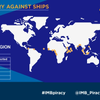French Coast Braced for Giant Tide
Towns on France's North Atlantic coast braced for their first giant tide of the millennium on Saturday as the full moon and this week's solar eclipse combined to create an ocean surge not seen since 1997.
At the picturesque Mont Saint Michel island where some of the biggest tides in the world occur, visitors gathered to watch the tide disappear out of sight, exposing areas of beach and rock visible only every 18 years. The next peak tide is not due until 2033.
France's National Hydrographic Service was expecting to measure more than 14 metres (15.3 yards) between low and high water around the famous Abbey-topped rock off France's north-west coast. Average tides in the area measure 8.7 metres.
Saturday morning's high tide was also close to peak levels as the sea rushed in from over 13 kilometres (8 miles) out, but calm weather has meant that some coastal flood preparations looked set to prove unnecessary and made the phenomenon less spectacular than some had hoped.
"For the 'tide of the century' I am a bit disappointed," said tourist Jean-Bernard Delamarche in Saint-Malo further west along the coast which also has big tides. "We came one year, we were staying at the hotel Ibis and we could not get out of the hotel because the street was flooded. But it's true that it is impressive."
"It's almost more spectacular at low tide in the end because you will be able to walk kilometres and see some little secret beaches that will only be revealed at this moment," said Laurence Bozzuffi, director of the Saint-Malo tourism office.
The lowest tide measured from the port of Granville up the coast from Mont Saint Michel was due at 3:16 pm local time (1416 GMT) with the highest at 8:10 pm.
The largest tidal ranges in the world occur in Canada at the Bay of Fundy and Ungava Bay where, according to the Canadian Hydrographic service, tides can reach 17 metres in height.
(Writing by Andrew Callus; Editing by Clelia Oziel)













